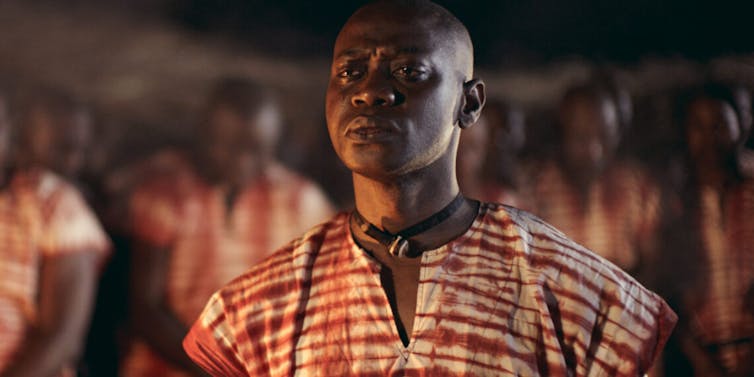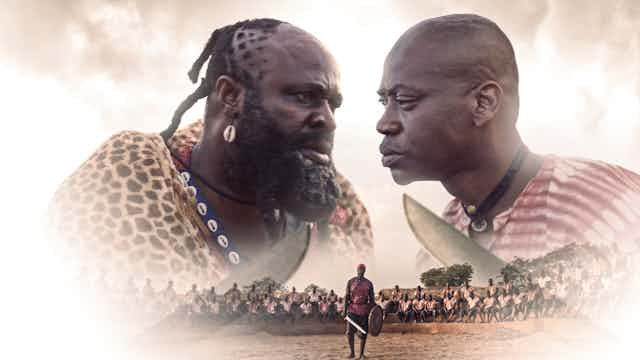Netflix’s recently released film Jagun Jagun (The Warrior) is set in pre-colonial Nigeria and follows the story of a feared warlord named Ogunjimi. While playing out in the past, it is steeped in contemporary universal cultural, political and socio-economic realities.
The first 15 minutes of the movie establishes that the story is centred on a young man called Gbotija who decides to train as a fighter under the leadership of a powerful and revered warrior, Ogundiji, son of Ogunrogba. Ogundiji is a ruler unto himself. The first couple of scenes accentuate the ingredients required for a would-be warrior, such as courage, determination and focus to succeed.
Gbotija, determined to become a mighty warrior, joins an elite army, encounters a manic warlord and discovers the love of a woman.
As a theatre professor, author, playwright, and film scholar I follow the output of Nollywood. Nigeria’s thriving film industry is increasingly attracting higher budgets and producing films of high screen value. Jagun Jagun is one such well produced films.
Is it any good?
The film’s art direction and visual and special effects are impressive. The fight choreography is noteworthy, the setting and scenography well thought out and the costume work is strong. The transitions are right on cue and seamless.
If I have to compare this movie with Anikulapo (2022) by Nigerian film-maker Kunle Afolayan, apart from having a lot in common in their deep roots in Yoruba epic narrative, I will simply say both creative efforts are from scions of veteran practitioners of the art on stage and on screen, namely the late Adeyemi Afolayan (Ade Love) and Adebayo Salami (Oga Bello), who also starred in this movie as one of the kings. Ade Love was an actor, director and producer. Kunle Afolayan is his son. Ade Love died in 1996 at 56 and was one of the early pioneers of such epic films as Ajani Ogun (1976) and Ija Ominira (1979).

The Ifa connection
Both Jagun Jagun and Anikulapo draw on the Ifa Corpus. This is why the Ifa Corpus remains a literary reference in Yoruba theatre and films. Ifa is an ancient religion and a complex system of divination conceptualised many centuries ago by the Yoruba people of west Africa. Ifa Yoruba religion is based on oral literature scriptures known as Odu Ifa or the Ifa Corpus. It is the blueprint of life used to guide humanity towards the manifestation of their destiny in a positive way. It provides guidance on how to make good decisions and how to proceed through uncertain times.
The lead actor, Femi Adebayo, has been helped on this path by vintage actor and Ifa priest Yemi Elebuibon.
Jagun Jagun adds to the growing number of recent films having major cultural prestige and eulogising Nigeria’s robust, heroic, creative and daring heritage in war, bravery, royalty, and the need for territorial protection.
Relevant story
Those looking at the story from a historical point of view should turn their binoculars to the recent happenings around our global village and its war mongering and wanton destruction.
Ogundiji can be heard in one scene discussing how the white men have just sent him some highly sophisticated weapons and he is going to try then out in his next escapade. The film therefore interrogates and explores some issues that I find universal, even though steeped in African and specifically Yoruba canons. It brings to mind, for instance, the ongoing war in Ukraine, and the gathering of world powers, represented by kings who are propped on the throne by the likes of Ogundiji.
It also brings to mind the art and business of mercenaries like the Wagner groups of our current realities.
The movie also speaks to Nigerian politicians and rulers who hide their own children abroad for safekeeping, mentoring and tutelage while deploying children and relatives of other citizens as cannon fodder in senseless wars and acts of aggression, before, during and after electioneering.
The film’s two love stories between Ajitoni, Wehinwo’s fiancee, and the rejected suitor, and Gbotija and Kitan are antithetical to how relationships are struck and sustained. Ajitoni does not want the man she is to be married to but loves another man. Kitan initiates a relationship with Gbotija as the man she chooses. A tale of conflicting affections that reflects the themes of the movie.
The new Nigerian cinema
Some critics of Jagun Jagun may see this movie as a Hollywoodisation or Chinese Kung Fu-nisation of Yoruwood, the other cinema in Nollywood, but it is also possible to see some cross-fertilisation. That is, it’s strongly influenced by art cinema like the films of US film-makers Scorsese and Coppola and others like 12 Monkeys and The Batman. I think, however, that movies will do well to explore cross-fertilisation more, possibly through upping budgets and taking Nigerian films to the next level, drawing new viewers.
Despite a staggering number of names of ancient kingdoms and too much focus on superficial historical references, it’s a really, really good movie. The plot is original and the direction is strong. Is this the present? Is this the past? Is there a future of Nollywood to be glimpsed in Jagun Jagun? I recommend you watch it so that you can engage in these debates.

